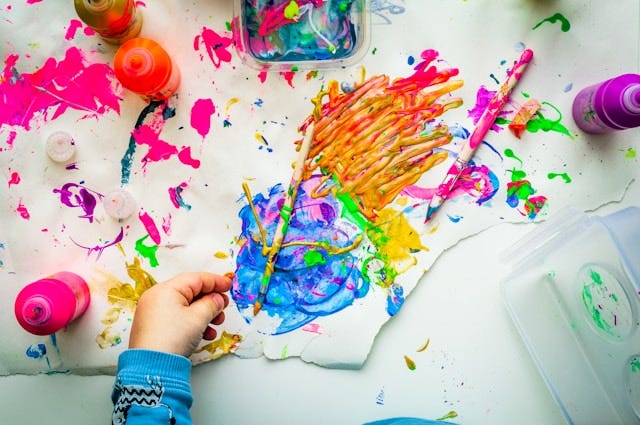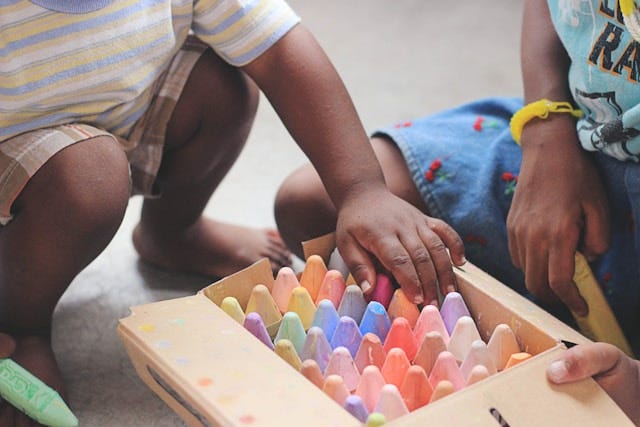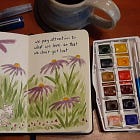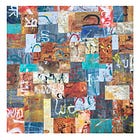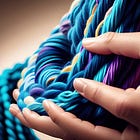D was pressured to become an artist as a child and it ruined art for a time ... art therapy as an adult changed that
An art and mental health interview about the complexities of art, perfectionism, and what happens in art therapy
A version of this interview appeared as one of my first newsletters released via Substack last year. I have edited it and am re-sharing today. It begins with a simple Q&A and then moves into a conversation about D’s experiences with art therapy interspersed with my own thoughts in italics.
I was so intrigued by this response to my interview questions from D, a massage therapist who has chosen to remain anonymous for this interview. There’s such a narrative in my mind of people who loved art as kids and would have liked to pursue a career in it but were discouraged from doing so as they were growing up. Their parents/teachers/society said to “get a real job” or said, “art is great but how will you make money.” I’ve seen this countless times … with my own eyes from writers who became lawyers, from books like The Artist’s Way which are all about erasing this messaging.
And yet, D brings us a completely different perspective, the experience of someone who was pressured to be a great artist and the experience really ruined art for them for a time. Although I can’t relate to that specific experience, D’s thoughts about creativity becoming a job instead of a release do resonate. As a full-time writer for the past two decades, that’s something that I’ve consistently grappled with and am constantly tweaking things to bring the soul and life and creativity and joy and play into the work.
So, let’s meet D.
Q: What were your earliest experiences with art?
As a child, I used drawing to cope with feelings that I didn't understand. I was very depressed. Drawing quietly in my room quickly turned into a way to be "the good child" and to hide in my room to stay away from my parents.
At that time, I drew anime and realism. It was my therapy.
Q: And what was the response by your family?
I felt like I was quickly brainwashed by everybody to think that art was going to be my career. Therefore, it wasn't a hobby anymore; it wasn’t fun anymore. Instead, it was the only thing that people knew me for. I then started to hate drawing for many reasons.
Q: What was one main reason that you began to really hate it?
Due to how I was growing up, everything had to be perfect the first time. The fear of messing up kept me from really trying different things. I perfected realism throughout time because it was “perfect.” Trying anything different and “messing up” made me afraid of what family and friends would say.
Q: Was there something else that you hated that stands out?
I hated when people told me to sell my art because then no one ever bought anything. Discouraged, I went from creating really intricate pieces to making absolutely nothing all together.
Q: So then what happened?
I started going to school to be an artist because that's what people wanted. But I woke up one day and decided "fuck it" it's not what I want. I didn’t know what I wanted because I wasn't given the chance to actually explore. I never went back to school for art. And in fact I didn’t pick up a pencil to draw for almost 10 years.
Q: What is your relationship with art now?
I actually started going to art therapy. It wasn't art that I hated; it was the people and the experience I was going through around it. I'm now exploring my fun artsy side with my therapist and I'm having so much fun. Cheap coloring pencils, a blank sketch book, and an adult coloring book is all I need to explore this aspect of myself.
Ultimately, there’s a similarity here to the people who abandoned art in favor of “real jobs” and to D’s experience of abandoning art as a way to make a living - beliefs from others at a young age impacted the way that they experienced art and themselves as artists. They didn’t get a chance to come into their own slowly and it impacted the role of art in their lives. Undeniably, others have a huge influence on us as artists /people … and this inevitably intertwines with our mental health.
For D, depression was healed through art, but then the art was co-opted in a sense by others who - intentionally or not - took away that healing power and put pressure to perform in its place. I don’t know more about D’s mental health so I won’t speak for them but I do know that for many of us, myself included, depression leads to feelings of worthlessness, self-esteem challenges, etc. and so I can guess that if you feel like your only worth is in your ability to create art but that you can’t live up to that expectation then it would exacerbate symptoms of depression.
Imagine, for example, if you have a headache, and you know from past experience that taking an Advil will make it go away, but you’ve been taught to believe that you don’t take them the right way so you don’t take it and your headache grows and grows and you not only feel physically worse but now you doubt your own ability to heal through the things that work for you. Or you know that resting your eyes in a dark room would make the headache go away but you’re told that is wrong, you’re lazy, and so you don’t, and the headache continues. It’s even harder with mental health than with headaches.
I was happy to learn that D was able to come back to art as therapy, to find the fun in the simplicity of it, and to allow that to be healing and self-exploratory in a positive way. So I followed up to ask more about that. I was curious about their experiences with other types of therapy and how they found their way to art therapy.
D shared:
When I was a freshman in high school, my mom forced me to go see a traditional therapist because she was "concerned." I liked drawing and staying in my room away from my siblings so that they wouldn't bug me. I just found a good group of friends that accepted me for who I was. I'm convinced that my mom didn't like those friends because they were considered emo/goth, and I think she believed drugs were involved when they weren't. The only thing that I really told that therapist was that I didn't want to be there. I told my mom that it made me feel worse and I never went back. That therapist wasn't for me. I didn't get much response from her, I was uncomfortable, and she kept making weird faces with nods while listening to me.
I didn't see my first therapist until I was an adult. I came from the kind of family/social world that were the “we don’t believe in therapy” type, like going was a flaw when you could just “buck up / nothing is wrong.” However, when I used to work in group homes and CPS with foster kids, all of the kids were in therapy, and what I saw most was that none of them wanted to go. Very few of them liked their therapists, most felt stigmatized by having to go, and often the first thing that they would ask me was if they could quit (not something I had control over anyway.) As an adult, I have found therapy complicated … finding the right therapist at the right time is hard, especially when you factor in insurance etc. However, I’ve also found therapy to be invaluable at times for myself.
So, I’m always curious about the experiences that children have in therapy and whether or not that ends up being a beneficial experience for them over the long haul even if they don’t “like” it at the time. (Which, of course, is different for everyone.) To be clear, I don’t think that therapy is “bad” for kids and believe it’s often good/needed/helpful etc. I’m just really curious about people’s own experiences of it because of how much I’ve seen kids not enjoy it. Of course plenty of things that are good for kids aren’t enjoyable for them in the moment, so I like learning about how those early experiences of it show up in the person’s life later as a positive/negative/neutral part of their own narrative.
D: Fast forward to about 4 years ago (after I quit art school) and I knew I needed something to help me. I was able to get anti-depressants and a cat for company since I just moved to the area and had no friends or job at the time. But once things started going, I got my job, I started a gym membership, and I continued to pursue my sewing and photography. I made plenty of quilts, costumes, and getting out and about for photography was a great way of nature therapy and really getting down and dirty for different angles of different plant life. I still knew deep down I needed to actually talk with someone for help with clarification, validation, etc. But remembering the ONE therapy session made it tricky because I didn't want to go and experience that again.
Last summer, I joined a second gym location to do kickboxing. It turned more into a physical therapy to get out anger. The instructor and my classmates would always say how strong I am but deep down I was just angry and emotional. Between kick boxing, personal training at the gym, and two physically demanding jobs, I was wearing myself out. But keeping myself busy was what kept away the emotions and keeping me distracted from thinking about anything. But again, I always knew deep down I needed to do something.
I relate so much to trying ALL THE THINGS to feel better. I shared some of my own journey with that in my book Crochet Saved My Life. As the title suggests, crochet is one of the things that helps to pull me out of depression. So did yoga. Along with meds and therapy. I give a lot of credit to the human spirit for trying so hard even under the pull of deep depression because we want to feel better. Sometimes therapy isn’t the “right” thing or it’s just one thing among many that help - I love hearing about how quilting and costume making and photography and kickboxing all played a role in healing for D.
D: Last November I invited friends over for "Friendsgiving" and I’m not sure how to feel about it. We really did have fun but there was shit going down in the meantime with one of my guests and the drama between my boyfriend and myself. I got too drunk. I puked everything out, popped a lot of blood vessels in my face (it looked like I was beaten, two black eyes, the whites of my eyes turning red from the blood, couldn't move away from the toilet because of the puking, couldn't have the lights on, couldn't drink water or eat anything) and I was out for a few weeks. I told my doctor that I really think I need to see a therapist but I don't want a traditional one. I told him that I always found art fun and used it as therapy. After some googling, I found that there was an art therapist right down the street.
This made me wonder about the therapy D went to as a child/teen. It sounds like it was a more traditional form of talk therapy, which is interesting since most of the people I know who work with kids use primarily play therapy, drama therapy, and art therapy - which includes talking but in a less “sit down and talk” direct way. I wonder if D’s experience would have been different if that had been the case.
D: I felt that the sessions went great. I wasn't sure what to expect but I love it. Visually seeing how things were laid out in front of me gave the validations I needed, realisations I needed, and a good look into what I want for myself in the future.
One of the things I have heard often when interviewing people about how crochet has helped them is that the ability to plan and complete a project transfers over and helps them to also figure out how to envision, plan, and move forward with other things that they want in their lives.
D: The first project my therapist had me do was make little drawings of family members. I started doing what I always did and tried to make them look super pretty and perfect. After a few minutes, I basically said "fuck it" and did fast and kinda crappy doodles. But it made me feel better because I wasn't being judged. About halfway through coloring everything in with colored pencils, I stopped for a moment and realised how much of the color red was in my family. I don't always see the color red as "angry" a lot, but this time, it was all I could think about. Then she had me rearrange them to explain to her and visually see where my family was. She had me draw different lines with different meanings and had me connect the family. For example, the nice straight line meant that the relationship was good. I would draw a straight line to my step-grandmother because her and I have a great relationship. The squiggly lines were strained relationships, and lines with x's through them meant that the relationship was super bad and pretty much cut off from the family. Once everything was drawn out, it visually made sense with the chaos I was dealing with since thats where everything was stemming from.
The lines between relationships reminds me of when I was asked to do a genogram for a class I was taking. Visually looking at the relationships in that way was really powerful for me.
She also had me do an exercise where I had two markers. One in each hand and all I had to do was make scribbles. I was so focused on the "perfectionism" and balance that it took me a long time to actually decide how I wanted to start drawing. She had me do it with markers and I had to accept whatever happened. My favorite project was going through magazines and cutting out what I liked that I wanted in my future (vision board). I also was inspired to get a notebook and markers to do at home stuff. I work on accepting messing up and not being able to fix it. I love making those scribble lines now. I just pick two random colors every day and just go. It makes me smile and I have fun with it. Unfortunately I came on some extremely hard financial times and haven't seen her in a few months. I'm excited to share the progress I've made on my own :)
I've also been trying to get rid of old art stuff so I've been happily getting messy like a 4 year old on a poster board with whatever I have that would have gone in the trash anyways.
That’s where we ended the conversation for now, although I hope to have the opportunity to keep connecting with D in the future.
If you read this far, perhaps you liked the work. The work does take work. It only continues with support, so please consider subscribing. My annual rate starts at $10 per year.




